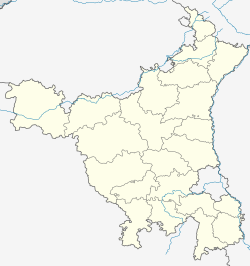Beri | |
|---|---|
Town | |
| Coordinates: 28°42′00″N 76°35′00″E / 28.7°N 76.5833°E | |
| State | Haryana |
| District | Jhajjar |
| Government | |
| • Type | District Administration Jhajjar |
| • Body | Sub Divisional Magistrate (S.D.M) |
| Elevation | 221 m (725 ft) |
| Population (2011) | |
• Total | 18,215 |
| Languages | |
| • Official | Hindi |
| Time zone | UTC+5:30 (IST) |
| PIN | 124201 |
| Vehicle registration | HR-77, HR-63 |
Beri is a town and a municipal committee in the Jhajjar district in the Indian state of Haryana. It was founded by Kadyan Jat Chaudharies. The city is 17 kilometres (11 mi) northwest of Jhajjar city and is a trading center. Beri is one of the largest tehsils of Haryana, including 77 villages. Beri is situated on the road connecting Gurgaon to Hisar and Kosli (Rewari) to Rohtak. This is the middle of these four cities. The First Chief Minister of Haryana, Bhagwat Dayal Sharma, was from Beri. The town has a temple dedicated to the goddess Mata Bhimeshwari Devi and Lord Krishna.[1] The "Beri Pashu Mela" or "Beri Cattle Fair" is celebrated in the days of Navratra every 6 months and is known for its donkeys and horses.[2]
Demographics
[edit]As of the 2011 census,[3] Beri had a population of about 30,000. Males constitute 54% of the population and females 46%. Beri has an average literacy rate of 70% higher than the national average of 59.5%, with 57% of the males and 43% of females literate. 13% of the population is under 6 years of age.
| Religion | Population (1911)[4]: 20 |
Percentage (1911) |
|---|---|---|
| Hinduism |
7,093 | 90.96% |
| Islam |
693 | 8.89% |
| Sikhism |
4 | 0.05% |
| Christianity |
1 | 0.01% |
| Others [a] | 7 | 0.09% |
| Total Population | 7,798 | 100% |
Notable people
[edit]- Raghuvir Singh Kadian — MLA of Beri
- B. D. Sharma — first Chief Minister of Haryana
References
[edit]- ^ "The Ancient Temple of Pandva's Bhimeshwari Goddess". Archived from the original on 22 May 2012.
- ^ "Sonu jalwa at Beri village, not sold in 5 million". Archived from the original on 6 September 2017. Retrieved 6 September 2017.
- ^ "Census of India 2001: Data from the 2011 Census, including cities, villages and towns (Provisional)". Census Commission of India. Archived from the original on 16 June 2004. Retrieved 1 November 2008.
- ^ "Census of India 1911. Vol. 14, Punjab. Pt. 2, Tables". Retrieved 21 August 2022.
- ^ Including Jainism, Buddhism, Zoroastrianism, Judaism, others, or not stated
This article incorporates text from a publication now in the public domain: Wood, James, ed. (1907). The Nuttall Encyclopædia. London and New York: Frederick Warne. {{cite encyclopedia}}: Missing or empty |title= (help)


